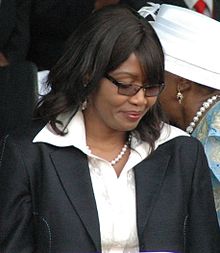Women in Namibia
 | |
| General Statistics | |
|---|---|
| Maternal mortality (per 100,000) | 265 (2015) |
| Women in parliament | 36.3% (2017) |
| Women over 25 with secondary education | 39.9% |
| Women in labour force | 58.5% (2017) |
| Gender Inequality Index[1] | |
| Value | 0.440 (2019) |
| Rank | 106th out of 162 |
| Global Gender Gap Index[2] | |
| Value | 0.809 (2021) |
| Rank | 6th out of 156 |
The government of Namibia has taken steps to provide women with equal rights largely to a degree that is largely unparalleled in Sub-Saharan Africa.[3][4] Despite these efforts gender based violence and access to health services and education remain challenges faced by women in Namibia.
Legal rights and parliamentary representation[]
The nation's 1990 constitution guarantees women equal protection under law and prohibits gender discrimination.[5][6]
Namibia outlawed marital rape in 2000.[7]

Within the past decade, Namibia has seen increased pushes for the representation of women in parliament. In 2014, the South West Africa People's Organisation introduced a policy committing to filling half of its seats in parliament with women, in addition to a "zebra" system in which a male prime minister would have a female deputy minister and vice versa.[4]
References[]
- ^ "Gender Inequality Index" (PDF). HUMAN DEVELOPMENT REPORTS. Retrieved 29 October 2021.
- ^ "Global Gender Gap Report 2021" (PDF). World Economic Forum. Retrieved 16 November 2021.
- ^ "Namibia". UN Women. Retrieved 2019-02-24.
- ^ a b O'Riordan, By Alexander; Service, from the South African Civil Society Information; AllAfrica.com, through; network, part of the Guardian development (2014-07-08). "Namibia's 'zebra' politics could make it stand out from the global herd | Alexander O'Riordan". The Guardian. ISSN 0261-3077. Retrieved 2019-02-24.
- ^ "Women's Property Rights In Namibia: An Investigative Report to Determine The Potential for Litigation" (PDF). University of Wyoming Human Rights Clinic. January 2015.
- ^ "| Human Development Reports". hdr.undp.org. Retrieved 2019-02-24.
- ^ "Refworld | Namibia: Domestic violence, including state protection, services and recourse available to victims". Unhcr.org. Retrieved 2013-08-17.
- Women in Namibia
- Namibia stubs